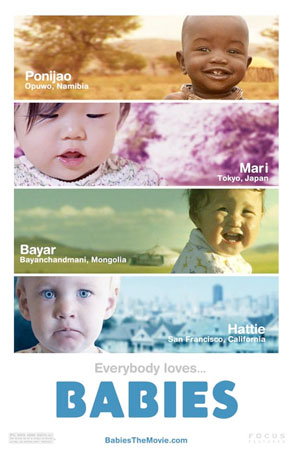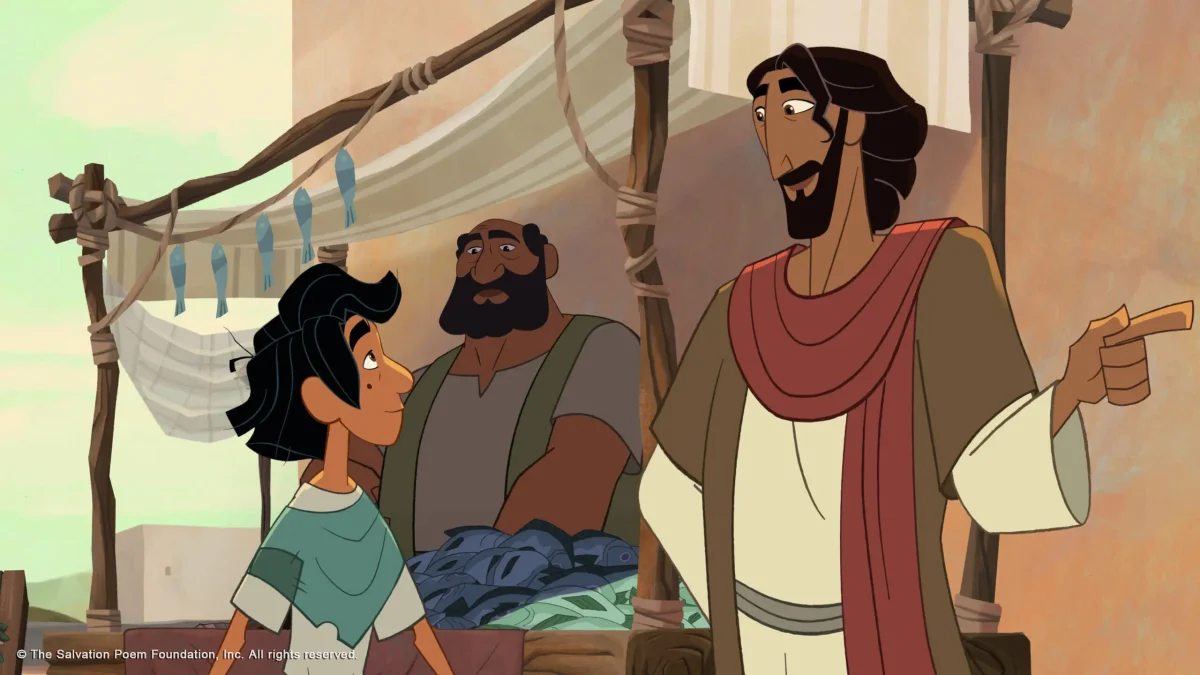Directed by Thomas Balmes, the new documentary “Babies” takes you around the globe from the urban worlds of Tokyo and San Francisco to the rural lives of Namibia and Mongolia. This unique 79-minute documentary takes viewers into vastly differing lifestyles, giving us a glimpse into the beginning milestones of the lives of four babies with extremely different surroundings.
We are introduced to each baby at birth, with the exception of Hattie, from San Francisco, who spends her first hours with tubes and wires at the hospital. Mari, from Tokyo, claims one of the cutest shots in the documentary as she works herself into frustrated rage at her inability to put the toy donut rings on a stick. Bayar, from Mongolia, is tormented by his older brother from the day of birth when his mother, just after labor, jumps on a motorcycle with the whole helmet-less family, back to their hut in the middle of nowhere. Ponijao from Namibia steals the show hands down with her bold interactions with the village animals and children living in an unfamiliar culture that we are so drawn to.
Without narrative, script, subtitles or statistics, the raw footage of these four goo-goo gah-gahing babies is absolutely captivating. The movie allows the viewer to sit back, delightfully observing the mundane lives of these evolving humans in their earliest stages. Though each personality and environment is unique, “Babies” shows us how universally similar we all are as humans.
The most compelling message I received from the documentary was the tender loving kindness of universal motherly love. No matter what lifestyle one lives, if a mother loves and nurtures her child, it will grow and mature just like any other baby in the world. “Babies” shows the similarity in the way humans were created; that children around the world are more alike than different. And no matter what they have, if it is great wealth or close to nothing, these babies are observing the world around them, processing things, no matter how advanced or fancy the teaching method is.
Though Hattie and Mari go to fancy and civilized classes while Bayer and Ponijao have virtually nothing but animals to entertain them, the love, discipline and protection is there to teach the children. Because we watch these children grow and develop at the same rate, we realize that no culture is better than another when it comes to raising babies. They all learn to crawl, walk, drink, eat and throw temper tantrums at the same rate. “Babies” destroys the misconceptions that some cultures are superior because they go to classes; in reality, most kids develop at the same rate no matter how intelligent the parents are. That nurturing love is the same. That mother-child bond is the same.
Balmes took producer Aliain Chabat’s idea on an expedition, searching the face of the earth for people who were sincerely happy to be having a baby. He said that one of the main attributes he desired in the families he would follow was that the child would be loved. This, in turn, became the loudest message in the documentary. Finally, in 2006, the mothers with child were chosen and Balmes spent the next two years flying from continent to continent. He shot footage with a digital camera and minimal crew so that the surroundings would be tainted as little as possible from their natural state. Shooting for a total of 400 days, this was no easy task for Balmes, as many of them consisted of 12-hour days that rewarded him sometimes with only one usable shot.
Fittingly, the movie came out on Mother’s Day, and for mothers, is a delight; but it is not for everyone. Though heart wrenching for most, if you have a hard time sitting still and observing, this movie might lose you at times as it jumps from one character to the next. Because there were no subtitles and minimal dialog, you are informed about nothing except what is set before you to watch.
Fathers are a minor glance in the movie, and in Africa, completely absent. Because we are never told where they were or given any background to how the tribe worked or functioned, the movie can get confusing. I would recommend this movie to most, as long as you are not expecting to be completely stimulated at all times. After all, it is a documentary. But it keeps you involved as you catch yourself saying “awww” quite often and smiling at the silly things these babies do.







